-Story about the lives of laborers in construction sites
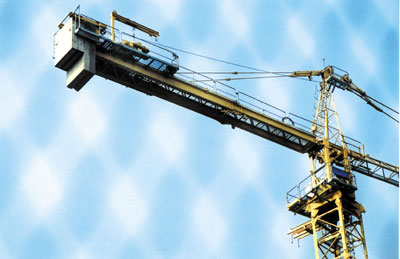 | ||
DAY AFTER day, city skylines are continuously growing higher like forests after the rain. Whole cities were reduced to dust during the Korean War, but in past decades this has been forgotten due to the spectacle of modern growth. Many buildings and roads are being completed rapidly and exist as pleasant living spaces for modern Korean society. It only took a half-century to give birth to our cities, and still, these are getting bigger. Every morning, when passing a new building, people ask themselves, "Where did that gorgeous building come from?" What has made this miracle possible? Who are the main contributors to these unbelievable results? Though not well recognized, they are the laborers in construction sites, who set up every metal fitting and lay bricks with their own hands. Sorrowfully, however, they are not getting the attention they deserve.
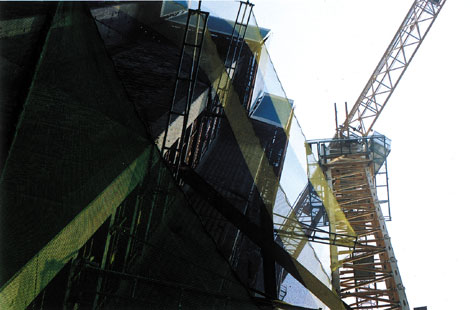 | ||
Construction workers are often referred to by the slang term nogada. It stemmed from the Japanese word "day laborer," which also has a meaning of "violent and reckless person." This word was used under Japanese rule in the early 1900s, but still has a negative connotation, reflecting people's attitude toward the construction workers. From laying the foundations and setting up the iron structures to doing small jobs like painting and cleaning, every little work is the laborers' job. We cannot be indifferent to them when hearing that an enormous number of people, officially about 1.8 million─the unofficial estimation is much larger─are engaged in construction work. The problem is that the rate of irregular employees in the construction industry is extremely higher than in any other job. It is estimated that about 70 percent of these workers are working under daily contracts.
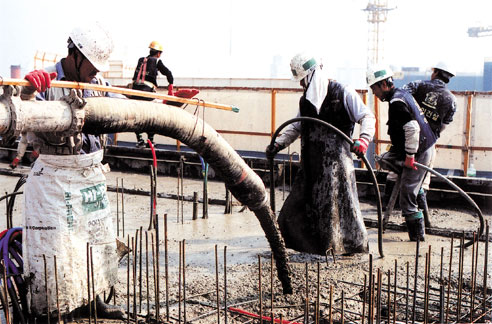 | ||
"Because I am not regularly employed, I sometimes feel the unfairness of this society," says Lee Sung-taek, who has worked for 15 years in construction sites. “It is true that our work is extremely dangerous compared to other labors, but it doesn't mean that we should not be qualified to benefit from social welfare and insurance." Most of the accident insurance companies classify them as "not qualified" due to the high occurrence of accidents. So, when hurt, or when dead at the worst, nothing can be done even when small construction companies, with no insurance, try to handle the situation without proper compensation. Surprisingly, this happens quite often. "If someone resists this unreasonable happening, he will not be able to avoid being neglected in this field of work. Nobody taught us, but everybody comes to learn this rule by himself." Their lives simply depend on the construction companies' diverse insurance systems, not on their individual choices for safety.
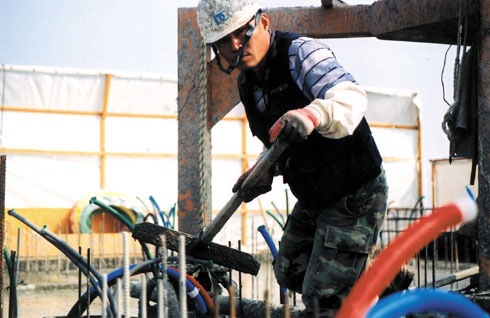 | ||
In addition, laborers are locked under "hopelessness." Hope comes even from the last one percent of possibility for a better situation, for example, a promotion or a raise. However, unlike other occupations, construction work is definitely far from the general hopes. Kim Hong-wan, a laborer, expresses his dissatisfaction toward the work system: "It does not matter how long you have worked or how good you are at construction. Even your accumulated know-how of 30 years does not increase your daily pays or improve your treatment. This is the main reason of our hopelessness." Truly, promotion or retirement grants simply do not exist on their lists of expectations.
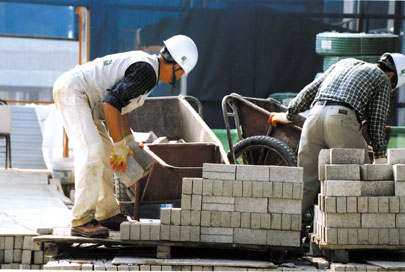 | ||
Still, they say they could stand all of these hardships only if there were enough work places. Kim says with a sigh, "Twenty years ago, when Korea was on the process of rapid industrialization, I used to work twenty-five days a month. At that time, this work even felt much better than my previous job. It is hard to believe myself, that recently, my working days per month are only about seven days on average." There are complex reasons for the lack of work places, but the nation-wide economic depression is the main cause. People say that the construction industry is the field that is most influenced by the economy and furthermore, changes in the economy are first felt in this industry. It obviously represents our country's economic situation. Therefore, the laborers' only hope is to see the domestic economy recovering, which will activate the construction industry and make more work places in the long run. Also, increasing foreign workers from China and Southeast Asia are one of their concerns. "Foreign workers work for lower wages than Koreans, so several companies prefer to hire them over us," says Lee. Some illegal companies even abuse this poor situation. Conscienceless employers suggest laborers to work for specific periods─a week or a month─on credit, which means that they require a contract with no time or wage limit. "Seldom, but it has happened that the illegal agents or employers just leave without having paid laborers who had worked for months," says a manager in a public employment agency. "Laborers know themselves that the contracts are unstable. However, they do not have any choice but to accept these unfair proposals. When they do not, they have to wait for another work chance, which might never come again."
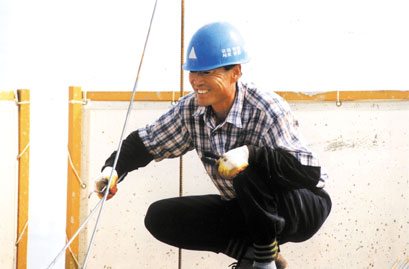 | ||
In spite of all these difficulties, they refuse to see people pity their miserable situation. Because their energetic labors are not less precious than any other job, the work itself is sometimes even a joy to them. They concentrate on their given works deeply, earnestly and with a sense of duty. Maybe it would be an excessive sympathy to regard them as a minority in our society who just need our concern. What they call for is a proper job and the fair treatment they deserve as laborers with equal rights like others. Our work is just to thank them and remember them at every step of the construction phase.
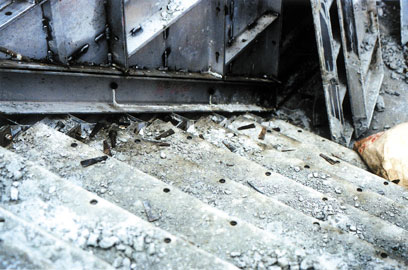 | ||

